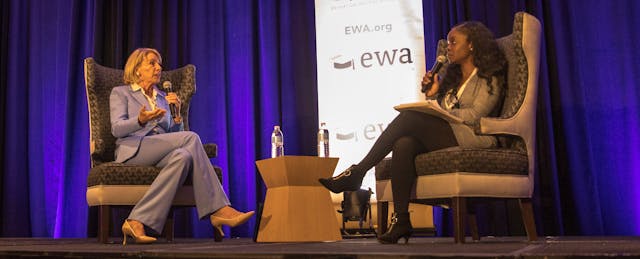Here are 3 facts you might not have known about Betsy DeVos: She’s an oldest child and, thus, an avid rule-follower. She describes herself as an “introvert” who takes little joy in the attention that comes with her position. And she doesn't like it when the media “use my name as clickbait or try to make it all about me”—education, she says, is about students and families.
That’s how the Education Secretary opened a recent talk to a room full of education journalists at the Education Writers Association annual convention in Baltimore.
And though she wished the media would take the spotlight off public figures like herself, that didn’t stop her from taking potshots at rivals, such as Randi Weingarten of the American Federation of Teachers union, or the Obama administration, in a talk that segued from prepared remarks to a conversation with New York Times reporter Erica L. Green.
As expected, DeVos spoke highly of school choice, and touted her Education Freedom Scholarships program as a way to make that reality. Released this February alongside her department’s proposed budget, the initiative would create a $5 billion fund for school choice vouchers for students in states that apply. Private companies and donors would contribute to the fund and receive a dollar-for-dollar tax credit in return.
“This represents change only for those people who want to make a change,” she said, adding that schools can choose between using that money to fund elementary, secondary or pre-K programs (though that last one is up for debate). While DeVos said she’s reaching out to Democrats to help pass it, she acknowledges an uphill battle awaits. Left unsaid: The 2020 federal budget proposal that would cut $8.8 billion from her department.
But it’s not just students that DeVos wants to shower with vouchers—she wants teachers in on the deal, too. The budget proposal requests a funding increase of $200 million for a program that would let teachers choose professional development programs that suit them, instead of attending one-size-fits-all trainings.
Due to the dire state of professional development, DeVos said she’s heard repeatedly from teachers that the only way they can grow professionally is by going into administration roles and leaving the classroom, which may be “the thing they’re best at. And I think that’s a tragedy for everyone.”
Green quickly used the opportunity to suggest another avenue for showing teachers appreciation and letting them grow: paying them more and reducing class sizes, bringing up last year’s teacher strikes as examples of efforts to achieve those same goals. “Do you support them in that advocacy as well?” Green asked.
Great teachers need to be well paid, DeVos replied, and said it is up to states to deal with those issues on their own. However, she added that she doesn’t support the way teachers chose to make that point. “I think it’s important that adults have adult disagreements on adult time, and that they not ultimately hurt kids in the process,” which teacher strikes do, she said.
After saying teaching has been “deprofessionalized,” DeVos couldn’t help throwing in a jab at Weingarten, president of one of the largest teachers’ unions and a vocal critic of the current Department of Education. “I think great teachers should be making at least half as much as Randi Weingarten does at a half a million dollars a year,” she said.
(In response, Weingarten issued a barbed statement of her own via press release. “I’d be delighted if Betsy wants to get all teachers close to $200,000—they deserve that—and so much more,” she said shortly after DeVos’ talk. Weingarten then voiced her support for a proposal from Senator Kamala Harris (D-Calif.), who is running for President, that would significantly boost teacher pay. “We could do this if Betsy worked with us to revoke tax cuts for rich people. She won’t even have to give up the summer homes and the yachts.”)
Later, DeVos justified rolling back Obama-era guidelines designed to provide more flexibility for transgender students, calling it an “overreach.” She used the same argument for rolling back affirmative action guidelines last year that advised schools to consider race in enrollment—a policy that she said she was unfamiliar with as recently as last month. And she cited “creative lawyering” from the Obama administration as a reason for why her department has delayed making determinations on whether 150,000 students are eligible for loan forgiveness from schools accused of defrauding them.
Before the session ended, DeVos took questions about her department’s role in stemming opioid use, a Tennessee voucher program that would exclude undocumented students, whether executives in for-profit schools should reap large bonuses, and research on Louisiana schools, which found that students who used vouchers to switch schools saw math scores drop.
To all four questions, she offered a similar response: These are questions for individual states, and not the federal government.
“It should surprise no one that I am a common-sense conservative with a healthy distrust of centralized government,” she said.


